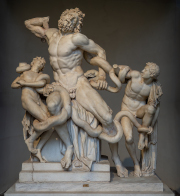|
Home
|
Nov 10, 2025
This week’s themeWords from English English This week’s words writhen shrive tidings screed bounden 
Laocoön and His Sons, 27 CE
Sculptor unknown Previous week’s theme Adverbs A.Word.A.Day
with Anu GargWhen I finish a marathon, one of the first questions I get is: “So, where are you running next.” In the past, I have replied Victoria, or Auckland, or Mumbai. This year, I’ve been replying simply: “Marathon.” That usually earns me a puzzled look. “What do you mean marathon?” Then I say, “The Marathon marathon.” After a few beats, I explain that I’m going to run the original marathon, where it all started, the one that started it all: from the town of Marathon, Greece, where Pheidippides ran to Athens to announce the Greek victory over the Persians in the Battle of Marathon. Well, this past weekend I traced Pheidippides’s footsteps, all 26 miles / 42 km of them. (map, photo) Before that I visited places such as Hydra and Delphi. It feels a bit surreal. What do you mean hydra is a place? It’s actually a monster! So, yes, I ran the Marathon Marathon. And somewhere around mile 20 (where the body starts negotiating with the soul), I started thinking about linguistic doubles, names that echo themselves. If you’re a purist who believes coffee should be black, you might ask someone ordering a caramel-whipped-iced-vanilla-something, “Are you drinking coffee coffee, or one of those sugary drinks with traces of coffee?” That line of thought led me to English English. Or words that are not borrowed, adopted, or naturalized from other languages, but born and bred in the language: Old English, also known as Anglo-Saxon. We’ve borrowed from dozens of tongues, for example, pundit from Hindi, mosquito from Spanish, and faux from French. But this week we’ll feature five good, old-fashioned English English words, descended straight from the linguistic ancestors. PS: You might expect a Greek-themed week (How could I resist, after a literal run through mythology?), but we’ve done that several times before. For example, see here, here, here, here, here, and here. PPS: Where should I run next? Keep your suggestions coming. writhen
PRONUNCIATION:
MEANING:
adjective: Twisted; coiled; contorted.
ETYMOLOGY:
From Old English, past participle of writhan (to twist). Earliest documented
use: before 1150.
NOTES:
Writhen describes anything turned or gnarled, from the roots of an
old oak to the wrought iron curls of a cathedral gate. Poets of old loved
the word, but in modern times, you might say politicians’ explanations,
corporate mission statements, and some user agreements come pre-writhen.
USAGE:
“In the back of the museum, beyond the more popular bones of the mastodon
and the saber-tooth, there were three twisted human skeletons posed in
elegant and writhen shapes.” Sadie Bruce; Little Girls in Bone Museums; Fantasy & Science Fiction (Newark, New Jersey); Mar/Apr 2015. See more usage examples of writhen in Vocabulary.com’s dictionary. A THOUGHT FOR TODAY:
You can preach a better sermon with your life than with your lips. -Oliver
Goldsmith, writer and physician (10 Nov 1730-1774)
|
|
Subscriber Services
Awards | Stats | Links | Privacy Policy
Contribute | Advertise
Awards | Stats | Links | Privacy Policy
Contribute | Advertise
© 1994-2026 Wordsmith